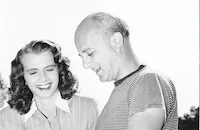Tokyo Rose
Cast & Crew
Lew Landers
Byron [s.] Barr
Osa Massen
Don Douglas
Richard Loo
Keye Luke
Film Details
Technical Specs

Synopsis
Tokyo Rose, an English-speaking Japanese woman radio broadcaster, regularly derides American soldiers during her broadcasts as part of Japanese propaganda efforts. Twelve American prisoners of war, including Pete Sherman, are taken from their cells by Colonel Suzuki and ordered to converse with Tokyo Rose, ostensibly so that she can brush up on her English skills and study their reactions to her program. However, Pete, who hates Tokyo Rose because her broadcasts drove a buddy to his death, breaks the recording devices after surmising that Suzuki hopes to record them saying that they are being treated well. A fight then breaks out between the POWs and the Japanese guards, after which Pete and fellow prisoner Mike Kovac are tortured. Pete agrees to cooperate with Suzuki only to spare Mike's life, but Suzuki kills Mike anyway. Suzuki then brings in foreign correspondents Eric Nordstrom, a Swede, and Irishman Timothy O'Brien to observe. When the broadcast is disrupted by a bombing raid, Pete escapes and is knocked unconscious by falling rubble. When he awakens, he finds Eric lying dead next to him, and takes his clothes and identification. Pete is then taken to see O'Brien, who is being questioned by Captain Okubo from the department of censorship. Both Eric's sister Greta and O'Brien accept Pete's impersonation without hesitation. After Okubo leaves, Pete tells Greta and O'Brien how Eric died. Pete is disgusted that the journalists appear to be neutral about the war despite Eric's death, and he reveals his desire to kill Tokyo Rose. The next morning, O'Brien arranges for Pete to meet with members of the underground movement. Pete is taken by truck to a bomb crater, underneath which is a secret cavern. There, Pete meets underground leader Chung Yu, and his compatriots Charlie Otani, Soon Hee and Wong. Pete earns their trust after helping Charlie fix their radio. Although Chung Yu arranges for Pete to escape by submarine, Pete insists on kidnapping Tokyo Rose, believing that he can gain access to the radio station by posing as Nordstrom. Greta becomes suspicious of O'Brien because he sees Suzuki immediately after meeting with Soon Hee, who is posing as their cleaning woman. Her suspicions appear to be well-founded, as O'Brien offers to turn over Pete and reveal the location of the underground to Suzuki in exchange for 10,000 pounds. Pete, Charlie and Chung Yu, meanwhile, follow a subterranean tunnel to Radio Tokyo, where Pete is admitted to interview Tokyo Rose. After he kidnaps the broadcaster, Greta warns them that Suzuki knows about their plan. Pete nevertheless convinces Charlie to return to the crater, but Suzuki and his soldiers are waiting for them. Pete destroys the troop with a grenade blast, and escapes to the submarine site with Tokyo Rose. Once there, Pete tells Chung Yu and Charlie that O'Brien's arrangement with Suzuki allowed them to grab Tokyo Rose easily, as Suzuki planned to defeat them at the crater. O'Brien then reports that the atomic bomb has just been detonated over Hiroshima, and that the war will soon be over. O'Brien, Greta and Pete, who is holding Tokyo Rose hostage, are then picked up by a submarine.

Director

Lew Landers
Cast
Byron [s.] Barr

Osa Massen

Don Douglas

Richard Loo

Keye Luke
Grace Lem
Leslie Fong
H. T. Tsiang
Larry Young
William Challee
Chris Drake

James Millican
Al Ruiz

Blake Edwards

Lotus Long
Crew
Henry Adams
Howard A. Anderson
Alice Barlow
Whitman Chambers
John N. Cope
Geoffrey Homes
Fred Jackman Jr.
Pop Levi
Bob Meiklejohn
Doc Merman
William H. Pine
Rudy Schrager
Maxwell Shane
Ray Smallwood
Howard Smith
F. Paul Sylos
William C. Thomas
Glenn [p.] Thompson
Frank Webster
Philip G. Wisdom

Film Details
Technical Specs

Quotes
Trivia
Notes
The above plot synopsis and credits were taken from a cutting continuity from the AMPAS Library. The Variety review notes that "Tokyo Rose," portrayed by Lotus Long, appears onscreen only toward the end of the film. It was not evident from the script if the filmmakers intended "Tokyo Rose" to be portrayed as Japanese or Japanese-American. According to a New York Times article and a Hollywood Reporter news item, filmmakers withheld writing the end of the film until after the production had started, so that it would not be outdated when it was released.
According to modern sources, twenty-seven Japanese-American women radio announcers were enlisted by the Japanese to make broadcasts intended for American troops during World War II. American government officials concluded, after an intensive post-war investigation, that no one named "Tokyo Rose" ever existed, nor was the name ever actually used in a broadcast. Nevertheless, public outcry against "Tokyo Rose," led by journalist Walter Winchell, resulted in an indictment against Iva Toguri, an American of Japanese descent who unwillingly became a radio announcer in Japan during the war. Toguri was tried as the infamous "Tokyo Rose" and found guilty of treason, and served eight years in prison. Later research into her case revealed that Toguri was innocent of the crime, and in 1977, President Gerald Ford granted her a full pardon.

Miscellaneous Notes
Released in United States Winter February 8, 1946
Released in United States Winter February 8, 1946











